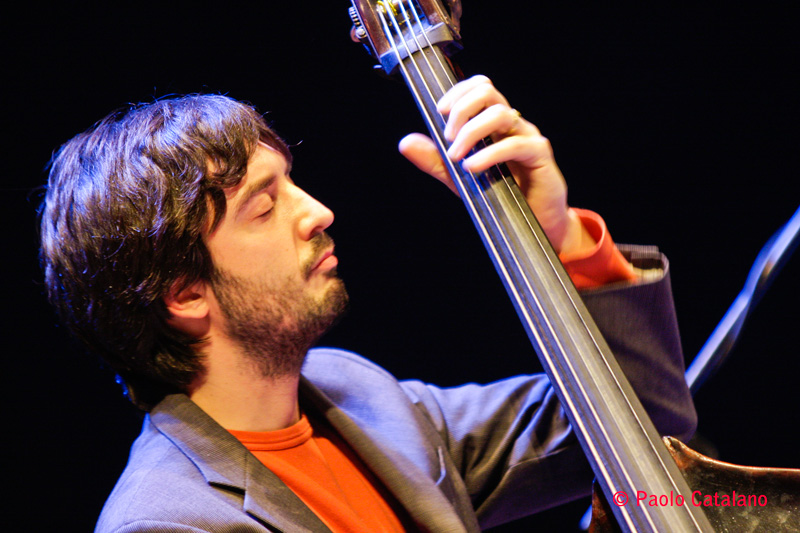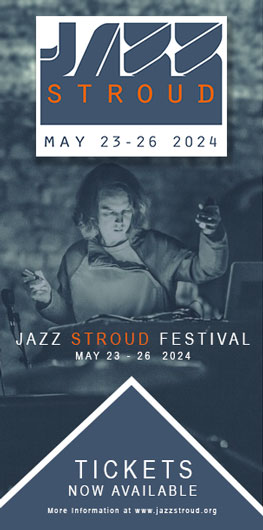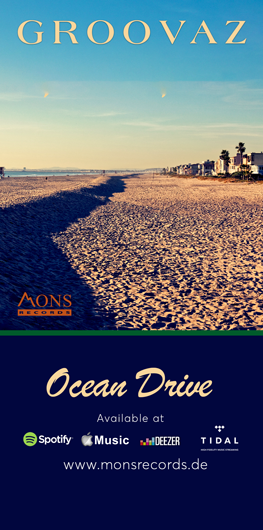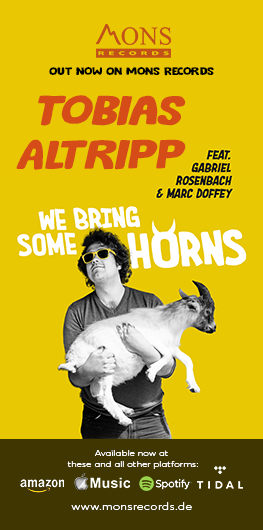By: Marta Ramon
Bass player Massimiliano Rolff is one of the most active jazz musicians in Italy, both in the creative but also in the educational field. Rolff has built a prolific career as a sideman, touring with among others the likes of Steve Grossman, Scott Hamilton, Perico Sambeat, Jesse Davis.
In addition to his outstanding reputation as a sideman, over the last few years he has worked hard to build a name as a leader allowing Rolff to developed his composition and arrangement skills with unquestionable success within the Italian jazz scene.
His latest work is Scream! (BlueArt, 2014), featuring a quartet with pianist Fabio Giachino, Nicola Angelucci on drums and Juan Carlos “Caldero” on percussions. Scream! Is Rolff’s fourth album as a leader that according to him, forms a new starting point.
Marta Ramón: A Miles Davis concert when you were 16 changed your life. What did you experience at this gig?
Massimiliano Rolff: Well, back in 1989 I was mainly into rock music. As a teenager I played electric bass in several pop-rock bands and some older friends of mine took me to this different concert… It was the tour of “Amandla”. I was very surprised to see so many people of different ages enjoying the concert of a “superstar” like Miles in a very relaxed way, compared to what usually happens at big rock concerts. The sound was amazingly strong, loud and powerful, with a great richness of different sounds. I think that what really knocked me out was the possibility to see this great approach of improvisation and imagination performed on the familiar and rich sounds of pop and rock. I must admit that Miles, that night, really made a bridge between past, present and future, with his amazing crossover of styles, he caught both the old and the young audience including myself. The day after, I ran to the first record store I could find to get some of his records. Of course one of the records I bought was “Kind of Blue” and from that point on I was a jazz fan, and the wheel started to roll, from Miles to Trane, to Monk, to Mingus and so on…
MR: Like many of the best European jazz musicians you studied in The Netherlands. Why do you think this country has a special feeling for jazz?
MW: I went to study in the Netherlands because in the 90’s the Italian educational system couldn’t offer an official degree in Jazz performance, and because I needed to start to experience life in a more international environment. While I was there I realized that Holland [Netherlands] was one of the first countries after the Second World War to invite Afro-American musicians from the U.S., to come and perform. In addition due to their open economy and large harbors Dutch people had a lot of access to American jazz records.
Dutch people are used to cosmopolitanism, they don’t have a strong musical heritage and they are great business people, so I guess that they were an interesting market for American jazz musicians. This way jazz very quickly became part of the Dutch music cultural background. Let’s not forget that Dutch people in the past played a big role in the establishment of the United States, in a way they have been one of the key elements in the birth of jazz music. Dutch Shultz was the owner of the Cotton Club in Harlem when Duke played there, and Harlem is a very nice city in the Netherlands…You see, so many points of contact…
MR: You also lived the NY jazz scene thanks to a scholarship from the Dutch government. What do you think are the biggest differences between the American and the European approach to the business side of the jazz scene?
MW: I’ve been lucky enough to tour the US three times, and what I can say is that the approach of Europeans and Americans to the jazz business is mainly the same approach they might have for general business: in US you are entitled to try, everybody will give you a chance with enthusiasm, but the business is harder and more competitive. In Europe there is less freshness and there are less possibilities of getting noticed and doing business, everybody is more suspicious and conservative, but in a way, once they know you well, you can establish a business relationship easily.
To be honest, when we talk of Europe economically, we always have to remember that the European economy runs at two different speeds, and this is clear also when we focus on music and jazz. Central and north European countries built up a strong social system, which puts music and culture at the top of the needs of people, being able to subsidize creative projects, tours, recordings and making things easier for jazz musicians. In Italy and in the other southern countries, it is very hard these days. In the last 5-7 years it seems that governments have decided not to invest and promote culture and music. In a way we are more similar to the United States, where culture is in the hands of private business and corporations, it seems that we are moving more and more in that direction, while in northern Europe jazz musicians are recognized more as important elements of the culture of the country they live in.
MR: You have developed an important career as a sideman, accompanying big figures and being part of different projects of foreign musicians who tour in Italy, but it looks like nowadays you are focusing and putting much more energy in your personal project. What lighted the flame?
MW: It’s true, during the last year I’ve put more energy into my own music, however if I look back at the last 10-15 years there have been many different creative waves in my career. There are moments when I felt it necessary to confront myself with someone else’s music, or with musicians that know a great deal about a specific music style. The inspiration this gives me helps me integrate all these aspects into my own compositions. I must say that the ‘flame’ has always been there, I keep on having the necessity to present something that belongs to me, to my thoughts and to my feelings… Being a sideman is just the perfect way to learn how to do it from other musicians, to learn how to support someone else’s ideas and to develop a language.
MR: This year you have launched your latest album as a leader, “SCREAM!”, this time you changed the formation and got by without horns. Do you feel that you are going into a new personal creative era?
MW: In “Scream!” there are no horns because I’m experiencing the feeling of being more exposed with my instrument. I’ve chosen to put the bass more in-front, playing some lead melodies and more solos. Right now, I’m quite satisfied with the sound of my band, during our concerts there is a good balance of exposure between the instruments, everybody has his own spot and his own space to perform. I feel that this aspect is very important to give fluidity to the concert and to create interest in the audience. I’m into constant researching, every moment in time is a new era, as long as the music is sincere and open-minded, and as long as all the musicians in the band feel like they are on the same wavelength. Without horns there is more room for rhythmic experiments and the music became immediately more intimate, while the harmonic aspect and counterpoints are more relevant. The percussion gives a sense of international originality, and adds color to a music that is usually thought of as black and white.
MR: You have always been in touch with different styles, rock and pop mainly, and now also we can listen to Latin as we can hear in Scream! How do they shape your compositions now that you are a front-line jazz-man in the Italian jazz panorama?
MW: With “Scream!” I came back to the idea of developing a sort of fusion of my musical experiences. The idea behind other albums such as “Naked” (Effemusic, 2010) or “More Music” (BlueArt, 2012) was to develop a personal sound within the most classic language of jazz. I believe that “Scream!” gives a more accurate view on my musical path. I wrote this music trying to free myself from a specific idiom and the result has been a mix of the musical experiences that I’ve been lucky enough to have crossed through my life, filtered through my strings. As a sideman I’ve performed lots of mainstream and avant-garde jazz, I’ve been part of professional pop-rock acts on stage and in several TV shows. I’ve worked in a salsa band attending dance parties in the Netherlands, I’ve performed blues, reggae and some Brazilian music as electric bass player; I’ve toured the south of the States coast to coast with a folk-rock band; I have performed middle-eastern music with a fantastic Iranian singer; I’m part of a project with a Bulgarian band and surely there’s more I can’t remember right now… well, all this is somehow in my blood and in my music, I just can’t help it. Now I feel that it is about time to let all this ring through my compositions.
MR: You are the musical director of the Count Basie Jazz Club. How do you see the situation of the jazz clubs in Italy? What difficulties are you facing?
MW: The jazz club scene in Italy is collapsing. In the last couple of years, many jazz clubs have closed down or have strongly reduced the number of concerts, while the audience wants still to attend shows. There is still a lot of interest in good music, especially in the small, beautiful and intimate dimensions of the jazz club, but the costs for clubs has become outrageous. Taxes, electricity, bar, salaries, rent and so on, are just too high to allow many places to be able to program concerts on a long term. As we said there’s not much help anymore from public institutions and in commercial business, jazz music just doesn’t pay enough to cover all the costs. The result is that some clubs like Count Basie Jazz Club in Genoa are surviving on a three month programming term, with a lot of debts and only thanks to the help of a lot of volunteers. It seems that sponsors are more interested in helping festival that provide big visibility in a short time like a week or few days, instead of investing on an ongoing basis culture like in a jazz club. That’s sad, isn’t it?
MR: You are also well-known because of your pedagogical dedication. How do you deal with this other musical facet? It feels vocational to you.
MW: When I teach I feel I am an educator, more than a teacher. It just feels like that. I always did it, and I think I could miss it if I ever quit. It’s hard to understand sometimes, but the energy you get back, especially from younger students is amazing, and in a way it really helps to stay in touch with reality. I don’t trust very much the theoretical pedagogy that I had to study back at the Conservatory: a good teacher must have a feeling for that, so, in a way, I think that after 15 years of teaching music at any level, I probably have this ‘vocational’ approach, that keeps this work going on.
MR: The Spanish trumpet player David Pastor will be playing with you in Italy next year. How did this collaboration come up?
MW: I had a call from Massimo DiStefano that runs this great booking agency in Valencia called E-Sound. He does bookings in Spain for several Italian artists. We have decided to cooperate, starting with a cross-collaboration between my project and the music of great Spanish trumpeter David Pastor. David has a very creative approach in composing and an absolute knowledge of his instrument. I had heard of him through our common friend Perico Sambeat, and I think he has a tone that might seriously lift up my music to another level. We’re both positive we can add something unique to each others music. The plan is that David will join my band for some concerts next spring in Italy, and I’ll tour with his outstanding trio in Spain next summer. It’s a great point to start, to connect our music worlds and our countries.
MR: Which are your next goals?
MW: Right now I’m trying to bring attention to the music of “Scream!” in other countries as much as possible. I’m planning different tours in Spain, Austria, Switzerland and of course, Italy. The sound is ready, and there is a lot of attention from critics and festivals. From the creation point of view, at the moment I am finishing a mix of a new work. It is music I wrote for string quartet, clarinet, double bass and percussion, that I’ve recorded with the great Italian clarinet player Gabriele Mirabassi. It is written music, with few improvised spots, with the vision that it will be performed in a show for dance and with digital projection of images, that I’ve written and directed, called “Italian Life in Contemporary Times”. It’s going to be a massive theater production that hopefully will debut in the fall 2015. I’m looking forward to that too! In the meantime, at the beginning of 2015, I’ll perform some shows as sideman with great American tenorist Scott Hamilton, one of my favorite jazz players of the ‘classic’ sound. Busy, busy, busy…
Last modified: July 15, 2018











